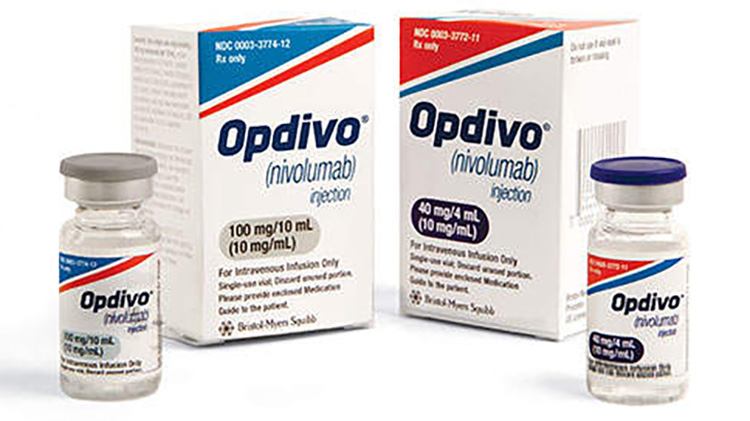Opdivo (Nivolumab) vs Columvi (glofitamab-gxbm)
Opdivo (Nivolumab) vs Columvi (glofitamab-gxbm)
Opdivo (nivolumab) is an immune checkpoint inhibitor that targets the PD-1/PD-L1 pathway, which is commonly used in various types of cancer, including melanoma, non-small cell lung cancer, and kidney cancer, to enhance the body's immune response against cancer cells. In contrast, glofitamab (not known as Columvi, which might be a typographical error) is a bispecific antibody designed to bind both CD20 on B cells and CD3 on T cells, redirecting T cells to engage and eliminate B-cell malignancies, and is being investigated for the treatment of conditions such as non-Hodgkin lymphoma. When deciding between these medications, it is crucial to consider the specific type of cancer being treated, the mechanism of action of each drug, and the patient's overall health and treatment history, as these factors will determine the appropriateness and potential effectiveness of each therapy.
Difference between Opdivo and Columvi
| Metric | Opdivo (Nivolumab) | Columvi (glofitamab-gxbm) |
|---|---|---|
| Generic name | Nivolumab | Glofitamab-gxbm |
| Indications | Various types of cancer, including melanoma, lung cancer, kidney cancer, bladder cancer, head and neck cancer, and others. | Currently being investigated for the treatment of B-cell non-Hodgkin lymphoma. |
| Mechanism of action | PD-1 receptor blocker, which inhibits the PD-1/PD-L1 pathway, enhancing the immune system's ability to fight cancer cells. | Bispecific monoclonal antibody that binds to both CD20 on B cells and CD3 on T cells, resulting in the activation of T cells and cytotoxic killing of B cells. |
| Brand names | Opdivo | Columvi |
| Administrative route | Intravenous infusion | Intravenous infusion |
| Side effects | Fatigue, rash, musculoskeletal pain, pruritus, diarrhea, nausea, decreased appetite, cough, dyspnea, constipation, vomiting, and increased liver enzymes. | Currently under investigation; side effects are not yet fully characterized. |
| Contraindications | Hypersensitivity to nivolumab or any of its excipients. | Not yet fully established as the drug is still under investigation. |
| Drug class | Immune checkpoint inhibitor | Bispecific monoclonal antibody |
| Manufacturer | Bristol-Myers Squibb | Genentech, a member of the Roche Group |
Efficacy
Efficacy of Opdivo (Nivolumab) in Lymphoma
Opdivo, known generically as Nivolumab, is a PD-1 (Programmed Death-1) inhibitor that has shown efficacy in the treatment of several types of cancer, including lymphoma. Specifically, it has been approved for the treatment of classical Hodgkin Lymphoma (cHL) after relapse or after failure of autologous hematopoietic stem cell transplantation (HSCT). The efficacy of Opdivo for this indication was demonstrated in clinical trials where a significant proportion of patients achieved partial or complete responses. The drug's mechanism of action involves the blockade of the PD-1 pathway, which enhances T-cell function and thereby exerts anti-tumor effects.
In studies, Opdivo has shown durable responses in relapsed or refractory cHL. The CheckMate 205 and CheckMate 039 trials, for instance, have provided evidence of Opdivo's efficacy, with overall response rates reported in the range of 65-87% in different cohorts. These studies also indicated that a subset of patients experienced long-term remission, suggesting that Opdivo can induce sustained disease control in some individuals with cHL.
Efficacy of Glofitamab (Columvi) in Lymphoma
Columvi, with the generic name glofitamab-gxbm, is an investigational bispecific antibody targeting CD20 on B-cells and CD3 on T-cells. While not yet approved for clinical use as of the knowledge cutoff date, early clinical trials have shown promising results in the treatment of non-Hodgkin Lymphoma (NHL). Glofitamab's unique mechanism of action recruits and activates T-cells to induce the killing of CD20-expressing B-cells, which are characteristic of certain types of NHL.
In early clinical studies, glofitamab has demonstrated substantial efficacy in patients with relapsed or refractory B-cell NHL. For instance, in a Phase I study, patients treated with glofitamab showed a high rate of complete responses, especially when administered in combination with obinutuzumab, another CD20-targeting monoclonal antibody. These preliminary findings suggest that glofitamab may offer a new therapeutic option for patients with aggressive forms of B-cell NHL who have exhausted other treatment avenues. However, further research is necessary to fully establish its efficacy and safety profile.
Regulatory Agency Approvals
Opdivo
-
European Medical Agency (EMA), European Union

-
Food and Drug Administration (FDA), USA

-
Health Canada

-
Pharmaceuticals and Medical Devices Agency (PMDA), Japan

-
Therapeutic Goods Administration (TGA), Australia

-
Medsafe (NZ)

Columvi
-
European Medical Agency (EMA), European Union

-
Food and Drug Administration (FDA), USA

Access Opdivo or Columvi today
If Opdivo or Columvi are not approved or available in your country (e.g. due to supply issues), you can access them via Everyone.org.
How it works

Make an enquiry
Choose the medicine you want to buy, answer a couple of questions, and upload your prescription to speed things up. We’ll get back to you within 24 hours.


Make an enquiry
Choose the medicine you want to buy, answer a couple of questions, and upload your prescription to speed things up. We’ll get back to you within 24 hours.


Breeze through the paperwork
We'll guide you through the required documents for importing unapproved medicine, ensuring you have all the necessary information.


Get a personalized quote
We’ll prepare a quote for you, including medicine costs and any shipping, administrative, or import fees that may apply.


Receive your medicine
Accept the quote and we’ll handle the rest - sourcing and safely delivering your medicine.

Some text on this page has been automatically generated. Speak to your physician before you start a new treatment or medication.
Let's talk
If you have any questions, call us or send us a message through WhatsApp or email:
Contact us




